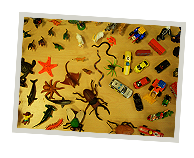Play Therapy at Sandworlds
Many children need help and support while growing up. Some have emotional and behaviour issues that prevent them from fulfilling their potential, or hinder school learning. Some studies indicate that 20% of children have some form of psychological problem. Statistics by Play Therapy UK indicate that up to 83% of children undertaking play therapy or therapeutic play experience a positive change. It is also essential to realise that mental health, like physical health, is as much about prevention as cure.
Play Therapy Toolkit
 Play Therapy has emerged as a mainstream mental health profession alongside counselling and psychotherapy, and the ‘play therapy toolkit’ comprises: art materials, sand tray, various sandplay miniature figures, musical instruments, movement and role play costumes and props, puppets, and games.
Play Therapy has emerged as a mainstream mental health profession alongside counselling and psychotherapy, and the ‘play therapy toolkit’ comprises: art materials, sand tray, various sandplay miniature figures, musical instruments, movement and role play costumes and props, puppets, and games.
As sessions take place, the issues that are on a child’s mind can often come to the forefront of their play, and the therapeutic process can enable emotional processing and adjustment from within. This type of therapy is based on Axline’s principles and is non-directive (child-led).
Much of current play therapy practice is based upon Virginia Axline’s work:
The Therapist...
- Develops a warm and friendly relationship with the child.
- Accepts the child as she or he is.
- Establishes a feeling of permission in the relationship so that the child feels free to express his or her feelings completely.
- Is alert to recognise the feelings the child is expressing and reflects these feelings back in such a manner that the child gains insight into his/her behaviour.
- Maintains a deep respect for the child’s ability to solve his/her problems and gives the child the opportunity to do so. The responsibility to make choices and to institute change is with the child.
- Does not attempt to direct the child’s actions or conversations in any manner. The child leads the way, the therapist follows.
- Does not hurry the therapy along. It is a gradual process and must be recognised as such by the therapist.
- Only establishes those limitations necessary to anchor the therapy to the world of reality and to make the child aware of his/her responsibility in the relationship.
How are the Effects of Therapy Assessed?
 Parents and/or teachers complete a short questionnaire (Goodman’s Strengths and Difficulties) before therapy sessions commence. A series of approximately 10 sessions is advised, and then when this review stage is reached, another questionnaire is completed, to allow a ‘before and after’ comparison. The first questionnaire scoring enables the therapist to give advice as to how many sessions may be required.
Parents and/or teachers complete a short questionnaire (Goodman’s Strengths and Difficulties) before therapy sessions commence. A series of approximately 10 sessions is advised, and then when this review stage is reached, another questionnaire is completed, to allow a ‘before and after’ comparison. The first questionnaire scoring enables the therapist to give advice as to how many sessions may be required.
What Else Should be Checked Before Commencing Play Therapy?
Play Therapy must be provided by a suitably qualified therapist. Normally, play therapists belong to a professional organisation such as Play Therapy UK, or the British Association of Play Therapists. Please check that the therapist is qualified and a member of one of these organisations prior to sessions commencing. The therapist should also be able to show CRB documentation.
What is the Next Stage?
Contact Jane to arrange a consultation at Sandworlds in Thelwall, Warrington.